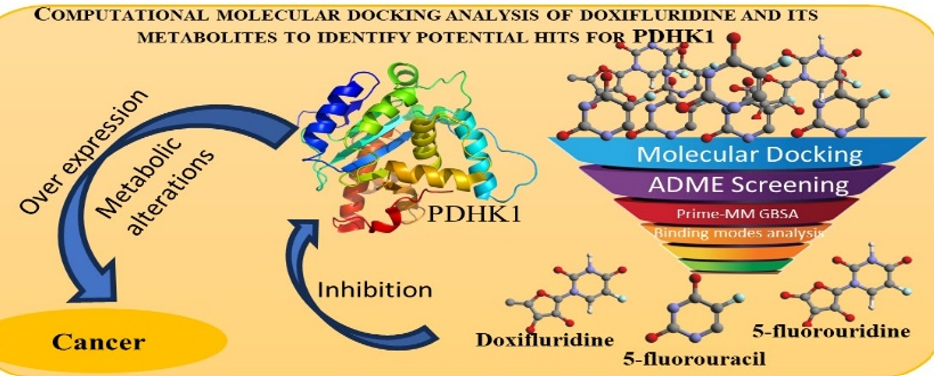Computational molecular docking analysis of Doxifluridine and its metabolites to identify potential hits for PDHK1

Keywords:
Doxifluridine, PDHK1, 5-fluorouracil, 5-fluorouridine, Molecular docking, Cancer drugsAbstract
The development of targeted therapies for cancer and metabolic diseases remains a critical research area. The discovery of strong inhibitors of Pyruvate Dehydrogenase Kinase 1 (PDHK1), an enzyme essential for metabolic reprogramming, has been the focus of research in recent years. Doxifluridine, a prodrug of 5-fluorouracil, has shown promise for various cancer treatments. Additionally, its metabolites are of interest because of their potential medicinal effects. This paper presents a comprehensive computational molecular docking and dynamics analysis aimed at investigating the binding capabilities of doxifluridine and its metabolites as PDHK1 inhibitors. Molecular docking analysis revealed that doxifluridine and its metabolites displayed favorable binding interactions within the ATP-binding pocket of PDHK1, with docking scores of -11.84, -6.39, and -11.35 kcal/mol for doxifluridine, 5-fluorouracil, and 5-fluororouridine, respectively. The binding energies of these ligands (-37.32, -20.90, and -28.19 kcal/mol, respectively) suggest their potential inhibitory activity against PDHK1. Furthermore, specific amino acid residues involved in ligand binding have been identified, elucidating the key interactions required for stabilization. Molecular dynamics simulations reveal that these interactions are retained throughout a simulation period of 100 ns and the binding energy is -57.83±3.40 kcal/mol.
URN:NBN:sciencein.jmc.2024.693
Downloads
Additional Files
Published
Issue
Section
URN
License
Copyright (c) 2024 Neeta Azad, Rita Kakkar

This work is licensed under a Creative Commons Attribution-NonCommercial-NoDerivatives 4.0 International License.



